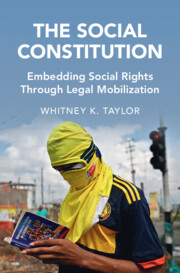‘Taylor’s excellent book details how rights, etched into the surface of a society and its politics through inclusion in a constitutional text, slowly begin to sink down and structure interactions among citizens, the relationship between citizens and the state, and the state itself. Using extensive fieldwork and original data from Colombia and South Africa, Taylor shows how legal mobilization moves this process along – a process she describes as the social and legal embedding of the constitution. The book fills an important gap in constitutional studies by addressing the transition from rights on paper to rights in action.’
Daniel M. Brinks - University of Texas at Austin
‘The Social Constitution describes the process through which social rights transit from the constitutional text to the core of the normative and empirical expectations of regular citizens, judges, and sociopolitical actors. Cycles of legal claim-making and judicial receptivity to demands of healthcare or housing breathe life into constitutional rights, progressively weaving the social fabric. Because the success of these processes is contingent and by no means assured, The Social Constitution insightfully identifies the conditions that make it more likely. Combining clear conceptualization, straightforward arguments, and careful in-depth empirical analysis on Colombia, Whitney Taylor’s book is an outstanding contribution to one of the fundamental issues in constitutional theory, judicial politics, and sociolegal analysis.’
Julio Ríos-Figueroa - ITAM (Mexico City)
‘The Social Constitution is a brilliant, important contribution to the scholarship on legal mobilization, institutional innovation, and social change. Professor Taylor offers a theoretically sophisticated argument analyzing legal arrangements that are practical, democratic alternatives to neoliberalism in and beyond the Global South. The project is anchored in compelling bottom-up empirical research attentive to both the positive possibilities and vexing constraints of embedded law for advancing social justice. Highly recommended!’
Michael McCann - University of Washington
‘Whitney Taylor is emerging as a leading thinker in a new wave of scholarship on law and courts. In The Social Constitution, she draws on a wealth of data to carefully unpack the social and legal dimensions of the embedding of social constitutional rights. Moving beyond the field’s traditional focus on countries in the Global North and an emphasis on civil and political rights, Taylor sheds new light on how and why constitutions matter.’
Lisa Vanhala - University College London
‘In this uncommonly elegant book, Whitney Taylor single-handedly reframes our understanding of the social welfare promises found in many of the world’s constitutions, showing with rich and subtle data that rights to healthcare, housing, clean water, and so much more have the potential to become real in the lives of ordinary people when supported from below by ongoing litigation, and from above by receptive judicial rulings. A compelling analysis, brimming with important ideas, and powerfully supported with a range of evidence.’
Charles Epp - The University of Kansas



